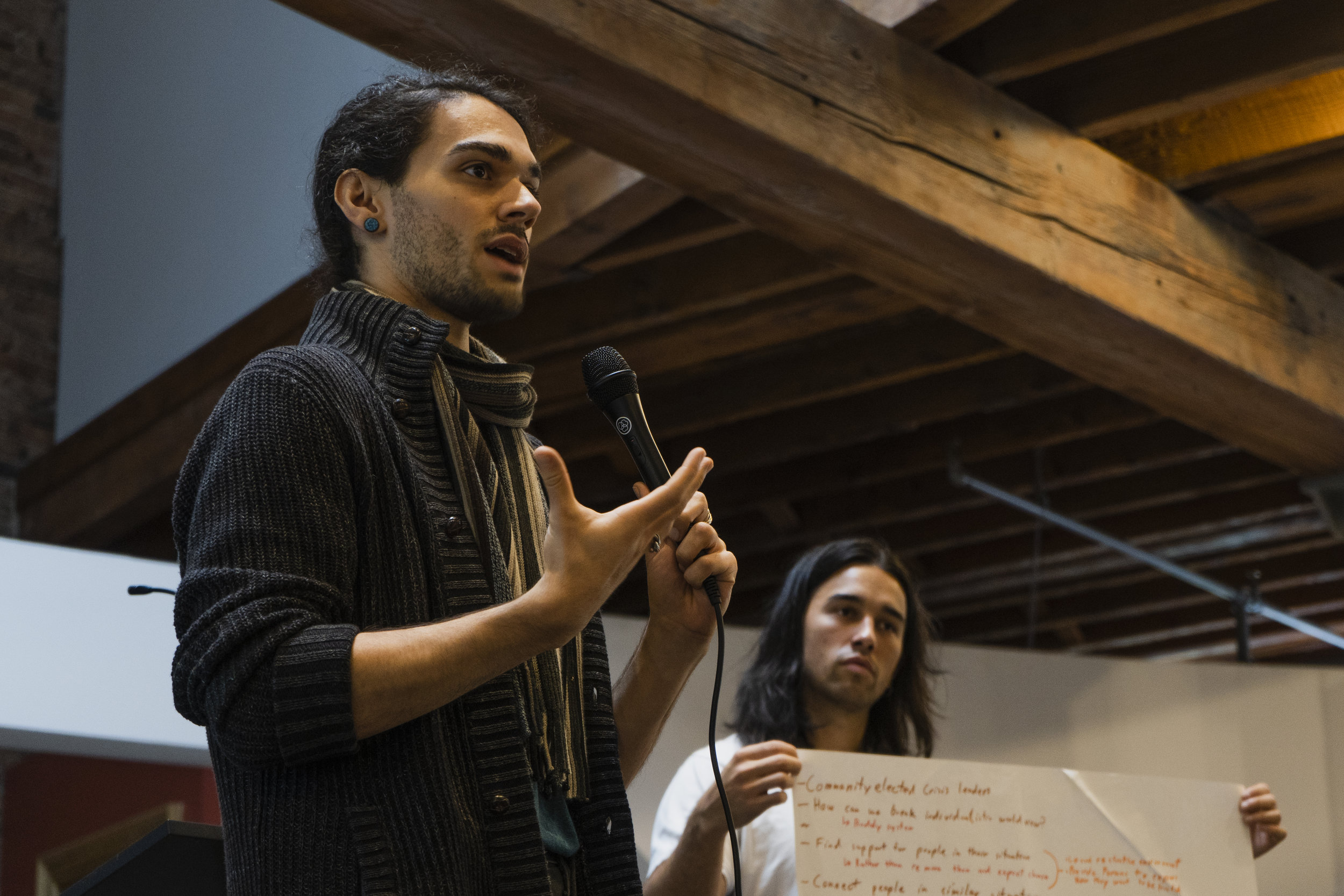Community Organizers Teach De-escalation 101
Timmy Rose facilitates the workshop
Photo By: Pat Nabong
Fiona Bradley didn’t know what to do when she saw a passenger sprawled out on the train’s floor at two in the morning.
“This person was incoherent and I was very afraid that they were like dead or about to die or something and so I wanted them to get help,” she recounted to a small group at a workshop that trains community members to respond to people in a mental health crisis. Eventually, another passenger called the police.
In a city where police officers have strained relationships with some communities, Bradley didn’t know if calling the police was going to help or make things worse, she said.
“A police officer being there created this tension,” said Bradley to the group. “I was like, where's the line between, like, getting this person to a hospital … and like the police also have to be involved in that situation? It was so difficult.”
Julius DeSantis, a participant of the free workshop, shares his group's thoughts about alternatives to policing.
Photo By: Pat Nabong
The day after the incident, Bradley reflected on that encounter at a free workshop hosted by Alternatives to Calling Police During a Mental Health Crisis. It is a collaborative of community organizers that aims to challenge reliance on police and provide de-escalation skills to community members, said Timmy Rose, a community organizer from People’s Response Team who facilitated the workshop. The group has organized workshops on the North, South and West Sides of the city, and have trained over 300 people, according to Rose.
“There are other options beside calling law enforcement in dealing with aggression or suicidality,” said Rose.
In April 2018, the Chicago Police Department issued a directive that details how to respond to incidents involving people with mental illness. Moreover, police have the option to undergo crisis intervention training. Although the training is voluntary for police officers, it is mandatory for field training officers and sergeants, according to a report released by CPD earlier this year.
“CPD continues to partner with the Office of Emergency Management and Communication (OEMC), NAMI Chicago, and various other community stakeholders to provide mental health awareness and de-escalation training for dispatchers and call-takers,” the report adds.
There are 2,488 officers within the ranks of CPD who have undergone crisis intervention training, according to the report. There are 12,000 sworn members of the department, the report adds.
But Rose and the collaborative believe that armed officers are not the best responders. “These are still officers with weapons going into situations, in escalated situations, and nine times out of ten, a person with a weapon is going to escalate a situation,” said Rose.
Out of the 987 people nationwide who were shot by police in 2017, 237 people or 24 percent had a known mental illness, according to data from The Washington Post.
During the workshop, organizers taught participants de-escalation techniques that may help pacify not only the person in crisis, but also bystanders. These tips are based on a combination of techniques that they learned from restorative justice practitioners in the community, according to Miguel Rodriguez, a facilitator who is also part of the People’s Response Team.
1. Decide when to get involved
Not all situations call for an intervention, said Rodriguez.
“It's not a hard and fast rule, but asking yourself is someone going to be harmed, either themselves or someone else, and if the answer is no, then it probably means that you don't need to intervene,” said Rodriguez.
Rodriguez encouraged people to be aware of their identity. “Based on your identity, you might not be the best person to intervene,” said Rodriguez. In that case, they can collaborate with others to help de-escalate the situation, he said.
2. Have the right mindset
When you do decide to become involved, you have to be in the right headspace, said Rodriguez. This entails being empathetic, non-judgmental and patient, he added.
“Remember that this is de-escalation,” said Rodriguez. “[Imagine] walking down the stairs, not running down the stairs, not jumping off the stairs. But walking down the stairs. Be patient. Know that it's not going to de-escalate right away.”
Lastly, if you decide to step into the situation, don’t leave if it gets messy. See the whole process through, he said.
3. Act accordingly
Start by introducing yourself if they do not know you, said Euree Kim, who helped facilitate the workshop. When talking with the person in crisis, Rose recommends standing or sitting where the person can see you and your hands, but also being mindful of their personal space. Rose added that it is important to ask for consent when closing that distance and laying a hand on them.
If it is happening in a public space where many people are watching, minimizing the audience can help de-escalate the situation. If possible, ask the person in crisis if they would like to move to a different place, said Rose.
4. Watch your words
What you say matters as much as how you say it.
When addressing the person experiencing a mental health crisis, avoid using gendered pronouns if you do not know how they prefer to be identified, Kim added. Kim also pointed out the importance of being attentive to the way people prefer to communicate; if they feel more comfortable writing down their thoughts instead of speaking, let them know that’s okay.
Avoid being accusatory and do not invalidate or doubt their experiences. “This happens very often,” said Kim. “For example, [phrases like], ‘I know you are doing this to drive me crazy’ [should be avoided].’” However, if they are hallucinating, do not lie and pretend that you are seeing what they are seeing too, said Kim.
Most importantly, respect the person’s autonomy by asking how you can help instead of giving advice, said Kim. When asking questions, give them time to think since some people take longer to process questions than others, advised Kim.
“It's very important to use the affirmative and reflective language rather than projecting your own opinion and perspective on the person's experience,” said Kim.
One strategy that’s often used in de-escalation is called reflecting back, which has three levels. The first level involves repeating or summarizing what the person is saying, said Rodriguez. After that, reflect the feelings and needs behind what they’re saying.
“They might have not flat out said that they're frustrated, but you can hear from what they're saying that they're frustrated,” said Rodriguez. “The other level is reflecting back the needs of the person, right so like, ‘I can see that you really need some peace or you really need some care.’”
The last level entails more reading between the lines since you have to interpret the values behind what the person is saying or doing, according to Rodriguez.
“The thing about reflecting back is not about getting it right,” he said. “It's really two main intentions for reflecting back: one is you want to communicate that you're making an effort to understand what they're going through….and the other intention is...to see if you actually are getting what the person is saying or experiencing.”
At the end of the workshop, Bradley felt like she was better equipped to not only react, but to engage with people who may be experiencing a mental health crisis. “Everyone's going to encounter situations and being prepared I feel is really important. Because when you're just freaked out, you're going to react but when you have this information, it's so helpful. It can save people, you know?”



